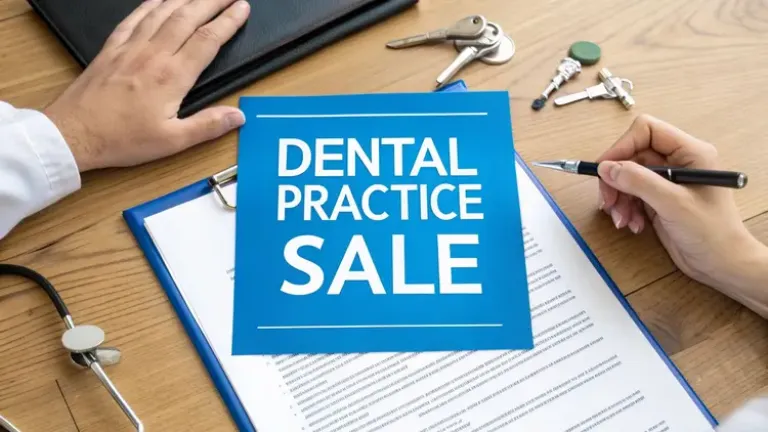
Author: Dr. William J Lossef, DDS | Head of Dental Practice Transitions
Selling your dental practice yourself is a real possibility, and it can save you tens of thousands of dollars in broker commissions. But let's be honest, going the "for sale by owner" (FSBO) route is a massive undertaking. It demands a serious investment of your time and a solid grasp of valuation, marketing, and the legal tightrope of negotiations to sidestep some very expensive mistakes.
Is Selling Your Dental Practice Yourself the Right Move?

Deciding to sell your practice on your own is one of the biggest financial decisions of your career. The main driver is almost always the money—skipping the typical 6-10% commission a broker charges can add a huge chunk to your final payout. On a $1 million practice, that’s a direct savings of $60,000 to $100,000. That kind of capital can seriously boost your retirement or fund your next chapter.
But this path isn’t a walk in the park. All the heavy lifting a broker does—valuation, marketing, screening buyers, and negotiating—lands squarely on your shoulders. It's essentially taking on a second full-time job while you're still running your practice.
Weighing Control Against Risk
When you sell your practice yourself, you're in the driver's seat for the entire process. You set the price, you decide who to talk to, and you lead the negotiations. For many dentists who are used to being in charge, this level of control is very appealing. After all, you know your practice better than anyone and can personally share its story and potential with buyers.
The flip side of that coin is the risk involved. A classic mistake I see with FSBO sellers is mispricing their own practice. Without the broad market data a broker has, owners often lean on old rules of thumb or, frankly, emotional attachment. This can lead to a valuation that’s either way too high, scaring off good buyers, or too low, leaving a pile of money on the table.
An owner’s deep connection to their practice can sometimes cloud their judgment during valuation. A third-party, objective analysis often uncovers value—or reveals overestimations—that the owner might miss.
The Commitment Beyond the Clinic
The time and energy required for an FSBO sale are immense and, in my experience, almost always underestimated. Just think about the key tasks you'll be juggling:
- Creating Marketing Materials: You'll need to develop a professional and confidential information memorandum (CIM) that breaks down your practice’s financials, operations, and assets.
- Confidential Marketing: The real challenge is finding qualified buyers without tipping off your staff, patients, or the dentist down the street.
- Buyer Vetting: This means sifting through potential buyers to ensure they're financially qualified and genuinely serious, which includes managing non-disclosure agreements (NDAs) to protect your information.
- Navigating Negotiations: You'll be handling offers and counter-offers, a high-stakes dance where a bit of experience can make a world of difference.
Ultimately, the choice to pursue a dental practice for sale by owner comes down to your personal appetite for risk, your business savvy, and how much time you can realistically dedicate to the process. For anyone thinking about this, whether you go FSBO or with a broker, it’s worth exploring a complete overview to sell a dental practice to make sure you understand every step involved.
How to Accurately Value Your Dental Practice
Nailing down the right price is hands-down the most important part of selling your dental practice yourself. A solid, accurate valuation sets the stage for everything that follows. If you overprice your life's work, you'll scare off qualified, serious buyers before you even get to a conversation. Price it too low, and you could easily leave tens, or even hundreds, of thousands of dollars behind. It’s a costly mistake.
You have to think like a buyer and their lender. They aren't just looking at a sticker price; they're digging into the story behind that number. This means you need to go way beyond the old rules of thumb and really get into the nitty-gritty of what makes your practice a valuable, ongoing business.
The Financial Core of Your Valuation
When it comes down to it, a practice valuation is a financial puzzle. Buyers need to see the hard numbers that back up your asking price. The most common method is applying a multiple to your practice's EBITDA—that’s Earnings Before Interest, Taxes, Depreciation, and Amortization. It’s a fancy term, but it simply shows your practice's core profitability and is the go-to metric for most business sales.
Another approach, often used by more sophisticated buyers, is the discounted cash flow (DCF) analysis. This one is a bit more complex. It involves projecting your practice's future earnings and then calculating what that future money is worth today. It's all about future potential, which is exactly what a savvy buyer is investing in.
To get started, you’ll need to have your financial house in perfect order. Get these documents ready for inspection:
- Profit and Loss (P&L) Statements: Have at least three years of detailed P&L statements ready to go. This is non-negotiable.
- Tax Returns: You'll need the corresponding business tax returns for those same three years.
- Production Reports: Buyers will want to see detailed reports breaking down production by each provider and by procedure code.
- Balance Sheets: These give a clear snapshot of your practice's assets and liabilities.
Having these records clean and organized does more than just speed things up. It sends a powerful signal to buyers that you run a tight ship. That kind of transparency builds trust right from the start.
Beyond the Numbers: Intangible Value Drivers
A practice is so much more than its cash flow. The intangible assets are what build the "story" that convinces a buyer your practice is worth a premium. You won't find these on a balance sheet, but their value is immense.
Think about it: a strong, loyal patient base that’s been with you for decades is a huge asset. A buyer sees that and immediately thinks "stable, recurring revenue" and "low risk." The same goes for your team. An experienced, stable staff that plans to stay on after you leave is a massive selling point. It promises continuity of care and smooth operations from day one.
The real value of a practice often lies in its goodwill—the reputation you’ve built in the community, the loyalty of your patients, and the strength of your team. These intangibles are what a buyer is truly purchasing.
The state of your equipment and technology also matters, big time. Is your practice running on modern digital X-rays, CAD/CAM systems, and up-to-date software? That's far more appealing than a practice where the buyer knows they’ll have to shell out for costly upgrades right away. They will absolutely factor the cost of those future expenses into any offer they make.
The Impact of Your Local Market
No practice operates in a bubble. Your location and the dynamics of your local market play a huge role in determining its value. A practice in a fast-growing suburb with great demographics will naturally fetch a higher price than one in an area with a declining population or too many competing dentists.
The North American dental market itself is incredibly strong, valued at USD 14.79 billion in 2024, which shows just how much demand there is for quality dental care. This economic backdrop means that valuations can vary wildly from one city or state to the next, so understanding your local competitive landscape is key.
When to Get a Professional Appraisal
Even though you’re handling the sale yourself to save on broker fees, skimping on a professional valuation is a classic rookie mistake. Getting an independent, third-party appraisal is one of the smartest investments you can make. It provides an objective, defensible assessment of what your practice is actually worth.
This formal report gives your asking price immediate credibility. It shows buyers your price isn't based on emotion or wishful thinking, but on sound financial principles and industry benchmarks. It becomes your most powerful negotiating tool. For a closer look at what this involves, check out our guide on professional dental practice valuations to see how the process works and why it's so beneficial.
Marketing Your Practice While Keeping It a Secret

Putting your dental practice for sale by owner out there is a real balancing act. You need to attract serious, qualified buyers, but you absolutely cannot cause a panic among your loyal staff, patients, or even the dentist across the street.
Loose lips don’t just sink ships; they can crater your practice’s value before you even get a single offer. The whole game hinges on a strategy I call "controlled disclosure." You tease just enough information to get the right people interested, then slowly reveal more only after they've been vetted and signed on the dotted line of a legal agreement.
Your Confidential Marketing Playbook
The single most important document you'll create is the Confidential Information Memorandum (CIM). Think of it as the professional prospectus for your life's work. This is the detailed report you share only with pre-qualified buyers who have signed a Non-Disclosure Agreement (NDA).
A solid CIM is much more than just numbers. It needs to tell the story of your practice. It should include:
- A Practice Overview: Tell your story. What’s the history, what's your philosophy of care, and what makes your practice unique in the community?
- Financial Vitals: You'll need at least three years of profit and loss statements, tax returns, and key performance metrics like production per provider.
- Operational Blueprint: Break down your team structure (using anonymous roles like "Lead Hygienist" or "Office Manager"), describe your patient base, and list your most common procedures.
- Asset Inventory: List all major equipment, the technology you use, and the critical details of your office lease.
In tandem with the CIM, you'll craft a "blind ad." This is the short, anonymous teaser you’ll post on listing websites. The goal is to be compelling but vague, highlighting attractive features without giving away who or where you are.
For instance, instead of saying, "Thriving practice in downtown Springfield," try something like, "Highly profitable general practice in a major Midwest metropolitan area."
Crafting the Perfect Blind Ad
Your blind ad is your first hook. Its only job is to get inquiries from people you can then start to screen. The best ads focus on the financial and lifestyle highlights that make your practice a great opportunity.
Key Pieces of a Winning Blind Ad:
| Ad Component | Example Phrasing | Why It Works |
|---|---|---|
| Headline | "Profitable General Dental Practice in Prime [State/Region] Location" | Hits strong keywords ("profitable," "general dental practice") with a broad, non-specific location. |
| Financials | "Consistent annual collections exceeding $1.2M with strong owner cash flow." | This quantifies success but doesn’t give away the exact figures from your P&L statement. |
| Practice Type | "Well-established FFS/PPO practice with a focus on restorative and cosmetic care." | Informs buyers about your business model and patient base without getting too granular. |
| Opportunity | "Significant growth potential by adding specialty services or expanding hours." | Shows the buyer the upside and future potential, which is a huge selling point. |
| Call to Action | "Serious, qualified buyers must sign an NDA to receive a detailed CIM." | This sets a professional tone from the start and immediately establishes your process. |
This method protects your identity while giving a serious buyer enough bait to recognize a fantastic opportunity when they see one.
Vetting Buyers and Guarding Your Information
Once the calls and emails start rolling in, your next job is to separate the serious contenders from the window shoppers. The very first step, without exception, is getting a signed Non-Disclosure Agreement. Do not share a single identifying detail before that NDA is in your hands.
After the NDA is signed, you can provide the full CIM. I’ve learned it's smart to have a quick qualifying chat first. Ask them about their financing, their timeline, and their dental experience. It saves you from pouring hours into someone who isn't actually in a position to buy.
Never underestimate the power of your professional network. A quiet word with trusted colleagues, your dental school's alumni association, or leaders in your local dental society can be invaluable. A personal referral is often the best lead you'll ever get.
Ultimately, your success in marketing your own practice comes down to managing the flow of information. By using a professional CIM, creating a smart anonymous ad, and meticulously screening every single inquiry, you can find the right buyer while protecting the business you've poured your heart into. This careful, methodical approach is what makes a successful FSBO sale possible.
Navigating Negotiations and Buyer Due Diligence
After all the prep work, marketing, and careful screening of potential buyers, an offer finally lands on your desk. This is the moment a dental practice for sale by owner deal starts to feel real. It's also where the real work begins—an intricate dance of finance, legal details, and personalities.
When you get that first offer, which usually comes as a Letter of Intent (LOI), take a moment. That initial offer is just a starting point. It's almost never the final one, so don’t get discouraged if the price is lower than you hoped or if some terms aren't quite right. Your response will set the tone for everything that follows.
A smart counter-offer is about more than just nudging the price up. It’s your chance to present a well-rounded package that covers all the critical points of the deal. This approach shows you're a serious professional who has thought through the entire transition, not just the final number.
The path from an initial offer to a signed agreement is a journey, with negotiation sitting right at the heart of it.
Key Deal Points to Negotiate Beyond Purchase Price
While the purchase price gets all the headlines, other terms in the agreement can have a much bigger impact on your financial health and future freedom. I’ve seen deals where a buyer offers a high price but loads the agreement with unfavorable terms that end up costing the seller a fortune down the road.
Beyond the dollar amount, here's what you need to focus on:
- Accounts Receivable (AR): Who collects the money owed by patients? Typically, the seller keeps the AR for services provided before the closing date. You have to define this clearly to prevent any post-sale headaches.
- Transition Period: How long are you expected to stick around and help the new owner? A defined window of 30 to 60 days is pretty standard. Make sure your role, any compensation, and your specific duties are spelled out.
- Non-Compete Clause: A buyer will absolutely insist on a non-compete. Your job is to make sure the geographic limits and the time frame are reasonable. You don't want to accidentally lock yourself out of future opportunities.
The best negotiations aren't about one person winning. It’s about finding a middle ground where both you and the buyer feel you've gotten a fair deal. If you push too hard on every single point, you risk souring the relationship—the last thing you want when you’re handing over your life’s work.
The table below breaks down some of the most critical negotiation points that go beyond the purchase price. Understanding both your goals and the buyer's perspective is key to finding common ground and structuring a deal that truly works for you.
| Negotiation Point | Owner's Goal (Seller) | Buyer's Goal |
|---|---|---|
| Accounts Receivable | Retain AR for services rendered pre-closing; ensure a clean collection process. | Avoid responsibility for collecting old debts; may want to buy AR at a discount. |
| Transition Period | A clearly defined, short-term role with specific duties and fair compensation. | Ensure a smooth handover of patients and systems; learn the practice's nuances. |
| Non-Compete Clause | Limit the geographic scope and duration to retain future career flexibility. | Protect their investment by preventing the seller from opening a nearby practice. |
| Employee Retention | Ensure key staff are treated fairly and retained to maintain practice stability. | Keep the experienced team in place to avoid disruption and maintain patient trust. |
| Working Capital | Keep as much cash in the business as possible at closing. | Ensure enough cash is left in the business to cover immediate operational costs. |
Negotiating these points thoughtfully protects your interests long after the sale is complete. It ensures a smoother transition and prevents misunderstandings that could lead to costly disputes.
Surviving the Due Diligence Deep Dive
Once you have an accepted LOI, get ready for the deep dive. The buyer will kick off their due diligence, which is their opportunity to verify every single piece of information you've shared. Think of it as a complete physical for your practice.
Your greatest ally during this phase is organization.
A buyer, along with their accountant, lawyer, and lender, will want to pore over a mountain of documents. Having everything organized and ready in a secure digital folder—often called a "data room"—will make the process move much faster and build a huge amount of trust.
Here's a quick look at what they'll ask for:
- Financials: Your last 3-5 years of profit and loss statements, tax returns, and balance sheets.
- Operations: Key reports like production and collections, current fee schedules, and verified active patient counts.
- Legal & HR: Your office lease, all employee contracts, and any service agreements for major equipment.
- Assets: A detailed list of all your equipment, noting its age, condition, and any outstanding loan or lease information.
Yes, due diligence can feel a bit invasive. But it’s a standard and absolutely necessary part of selling any business. Responding to questions quickly and providing clear documents shows you have nothing to hide and turns potential roadblocks into minor bumps in the road. This is your final chance to prove your practice's value and set the stage for a smooth closing.
Finalizing the Sale and Ensuring a Smooth Transition

After all the work of valuation, marketing, and tough negotiations, you're finally at the finish line. But getting the sale of your dental practice finalized isn't just about a handshake. It's a carefully orchestrated process that demands precision to protect both your financial future and the legacy you’ve built.
This is the moment your professional team becomes absolutely essential.
Even if you’ve navigated every step of your dental practice for sale by owner journey on your own, now is absolutely not the time to cut corners. You need a team that includes a healthcare-specific attorney and a CPA who lives and breathes dental practice transitions. Their expertise is what stands between you and a world of legal and financial headaches.
Assembling Your Closing Team
Think of your attorney as the architect of the definitive purchase agreement. This is the ironclad, legally binding document that replaces the initial Letter of Intent (LOI) and spells out every last term of the sale. It’s a dense, complex contract, and having a lawyer who gets the nuances of healthcare law is completely non-negotiable.
Your CPA works right alongside your attorney to structure the deal for the best possible tax outcome. They’ll dive deep into the purchase price allocation—how the sale price is divided among assets like equipment, goodwill, and your non-compete covenant. Each of these is taxed differently, and a poor allocation could easily cost you tens of thousands in unnecessary taxes.
Decoding the Definitive Purchase Agreement
The purchase agreement is the official rulebook for the entire closing process. Your attorney will guide you, but you need to pay close attention to several key clauses that shield you from future liability.
- Representations and Warranties: These are basically promises you make about the state of the practice. You're "representing" that your financials are accurate and there are no hidden lawsuits. If any of these turn out to be untrue, you could find yourself in legal hot water after the sale.
- Closing Conditions: This section lists everything that must happen before the deal is official. It often includes the buyer securing their financing, a successful transfer of the office lease, or ensuring your key team members agree to stay on with the new owner.
- Indemnification Clauses: This critical clause outlines who pays for what if something unexpected goes wrong after the closing. It’s your roadmap for how you and the buyer will handle unforeseen problems down the road.
A well-drafted purchase agreement is your ultimate insurance policy. It clearly defines the responsibilities of both parties and provides a legal framework for resolving any disputes, protecting the assets you've worked a lifetime to build.
Getting these details right can feel overwhelming, and it's smart to anticipate all potential expenses. You can learn more by reading our guide on what it costs to sell a dental practice, which will help you budget for this final stage.
The Closing Day and Post-Sale Responsibilities
Closing day itself is often less dramatic than you might imagine. It typically involves signing the final pile of documents and the secure transfer of funds, which is almost always handled through a neutral escrow service. Your attorney will coordinate everything to ensure all paperwork is executed perfectly and the money is transferred safely.
But your job isn't quite done when the funds hit your account.
A smooth transition is crucial for the practice's continued success and, frankly, for your own reputation. This means having a solid plan to ensure continuity for both the staff and the patients.
This plan often involves you staying on for a short, predetermined period—usually 30 to 90 days—to introduce the new owner to patients, staff, and your key referral sources. It also means a seamless handover of the practice's digital backbone. The dental practice management software market, valued at around USD 2.71 billion in 2024, is a massive part of a practice's operational value, and buyers expect a clean transfer of these systems.
Your final responsibility is to your patients. Sending a carefully worded letter announcing your retirement and personally introducing the new dentist is more than a professional courtesy; it's a best practice. It reassures patients, builds instant goodwill for the new owner, and allows you to make a graceful exit, cementing your legacy of trust and quality care.
Common Questions When Selling a Dental Practice Yourself
Going the "for sale by owner" route is a big decision, and it naturally comes with a long list of questions. I get it. It’s not the path most dentists take, and the unknowns can feel overwhelming. Let's walk through some of the most common concerns I hear from doctors to bring some clarity to the process.
One of the first things dentists ask is, "When is the right time to sell?" While your personal readiness is the most important factor, you can't ignore what the market is doing. Right now, the demand for quality dental care is creating a strong seller's market, which is fantastic news if you're thinking of listing.
The industry is incredibly healthy. The global dental market was valued at around USD 39.40 billion in 2024 and is expected to explode to USD 95.89 billion by 2033. This growth means there’s a deep pool of eager buyers out there. You can dig into more of these trends on Fortune Business Insights.
How Can I Keep the Sale a Secret From My Staff and Patients?
This is, hands down, the biggest worry for any selling dentist. The fear that your team will get anxious and your patients will feel abandoned is completely valid. A premature leak can rock the stability of the very practice you're trying to sell.
The key is a carefully controlled, confidential marketing strategy. Here’s how we handle it:
- Create "Blind" Listings: Your marketing ads should be intentionally vague. Talk about the practice's profitability, the patient base (like the FFS/PPO mix), and the general area (e.g., "profitable practice in a thriving Southeast suburb"). Never give away identifying details upfront.
- Insist on an NDA: This is non-negotiable. Before you share a single piece of sensitive information—the practice name, financials, or even the address—every potential buyer must sign a rock-solid Non-Disclosure Agreement (NDA).
- Schedule Showings After Hours: Any tours or meetings with potential buyers should happen on evenings or weekends when the office is completely empty. This avoids any awkward run-ins or office gossip.
Confidentiality isn't just about being discreet; it's a core strategy for preserving your practice's value. A single rumor can cause real, measurable damage to what you've built.
What Are the Biggest Legal Risks of an FSBO Sale?
When you decide to sell without a broker, you're also stepping into the role of legal project manager. The most significant risks I see come from two places: a poorly written purchase agreement and an incomplete due diligence process.
Without an expert eye, you might miss clauses that protect you from headaches down the road. For example, vague language around "representations and warranties" could leave you on the hook for legal claims from the buyer long after you’ve handed over the keys. A weak non-compete clause might not hold up in court, or one that’s too restrictive could unfairly box in your future career options.
To sidestep these landmines, hiring an attorney who specializes in healthcare transactions isn't a luxury—it's an absolute must for any FSBO seller. Their experience is what ensures your final contract is airtight and your interests are fully protected.
What Happens if the Owner Passes Away During the Sale Process?
This is a tough topic, but one we have to address because life is unpredictable. If a solo practitioner dies unexpectedly, the situation becomes both urgent and legally complicated. In nearly every state, only a licensed dentist can legally own a practice.
This means a non-dentist spouse or heir can't keep the practice running. The practice's value starts to plummet almost immediately as patients drift away and your team looks for new jobs.
This is why having a contingency plan is so critical. It could be an agreement with a local colleague to step in as a temporary manager while the sale is pushed through. The owner’s spouse or estate would need to work with their legal team to fast-track a sale to a licensed buyer to salvage as much of the practice's value as possible.
Do I Have to Send a Letter to Patients Announcing the Sale?
While it might not be a strict legal requirement in your state, sending a transition letter is an absolute best practice and a professional courtesy. Your patients have put their trust in you for years; they deserve to hear the news from you personally.
A well-written letter does a few crucial things:
- Maintains Trust: It reassures patients and stops them from being caught off guard by the change.
- Endorses the New Owner: This is your chance to introduce the new dentist, vouch for their skills, and highlight your shared philosophy of care.
- Ensures a Smooth Handoff: It lets patients know that the friendly faces on your staff are staying and that their records are safe and secure.
Skipping this step can feel like an abrupt departure. It can lead to patient attrition and damage the goodwill you've worked so hard to build—and that you're now selling. A thoughtful announcement letter is one of the final, and most important, acts in protecting your legacy.
At US Dental Practices, we know that selling your practice is one of the most significant moments of your career. Whether you need a formal valuation to justify your asking price or an expert partner to guide you through the sale, our team is here to help. Find out how we can support your transition.
